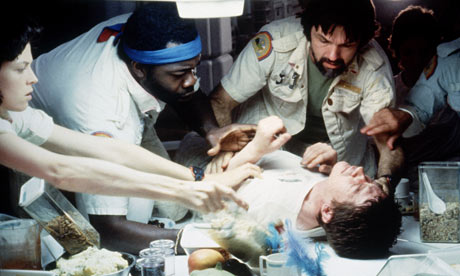

Director: Ridley Scott, 1979. (R)
Before his paradigmatic sci-fi masterpiece Blade Runner (1982), Ridley Scott cut his teeth in the genre with this classic. Despite being considered science fiction, it is really a horror film, with a standard B-movie plot. But Scott rises above the genre norm with excellent editing, moody atmosphere, and terrific acting to start a series (there have been 4 sequels and a recent prequel, Prometheus, directed by Scott himself) and launch a star: Sigourney Weaver used this role to springboard a career.
Aboard the deep space mining ship Nostromo, the crew of seven are awakened prematurely to investigate a strange SOS signal the ship has picked up. At first the blue-collar crew bickers over union contracts and shares to be received, particularly Parker (Yaphet Kotto) and Brett (Harry Dean Stanton), but Dallas (Tom Skerritt), the captain, pulls them back to reality. They are obligated by the ship's company's terms and conditions to check it out or forfeit all shares.
When they do send a shuttle down to the planetoid, they experience trouble: in the form of vehicular damage and weather. Yet, Dallas and two others, Kane (John Hurt) and Lambert (Veronica Cartwright) go exploring. What they find is astonishing: a space vehicle with a petrified alien, and deep down in a cavernous area hundreds of eggs, sitting below a bluish glow. One hatches and attaches itself to Kane. The other two crew members, Ripley (Weaver) and Ash (Ian Holm, later to be Bilbo Baggins in The Fellowship of the Ring) remain aboard, and it is these two actors who provide the standout performances.
 Most know the kernel of the story by now. The alien parasite burrows into Kane, to gestate and emerges in one of cinema's most memorable birth scenes: a cesarean section of sorts. It is from here that the real story begins.
Most know the kernel of the story by now. The alien parasite burrows into Kane, to gestate and emerges in one of cinema's most memorable birth scenes: a cesarean section of sorts. It is from here that the real story begins.Scott takes his time leading us through the first half of the film, setting up characters and motivations. By the time this birth takes place, we are ready for the film to turn dark. With the dark labyrinthian interiors of the working ship, any space could be hiding the creature. And by not revealing it too soon, it plays on the audience's imagination and lend a sense of trepidation and terror. As the crew begin to disappear one by one, this classic horror trope ratchets the tension. The accompanying discordant score and the jittery visuals (smoke, flashing warning lights) add to the moody atmosphere of dread. It all leads up to the climactic scene when Ripley faces her fears and faces off with the fearsome alien. Along the way there are some nasty surprises among the crew and from the mother corporation.
 At one point in the film Ash, the science officer, comments admiringly on the "purity" of the still young alien. What he means is its lack of self-awareness that would require a moral code. Instead, it is pure in its desire for self-survival at any cost to anything.
At one point in the film Ash, the science officer, comments admiringly on the "purity" of the still young alien. What he means is its lack of self-awareness that would require a moral code. Instead, it is pure in its desire for self-survival at any cost to anything.Purity is a biblical virtue. Paul tells his young friend Timothy, "Don’t let anyone look down on you because you are young, but set an example for the believers in speech, in conduct, in love, in faith and in purity" (1 Tim. 4:12). Jesus himself preached in the beatitudes, "Blessed are the pure in heart, for they will see God" (Matt. 5:8). It is clear that we are "to be self-controlled and pure" (Tit. 2:5).
Our purity, though, is not at the price of morality. We seek to serve others, to live selflessly not to survive at any cost. Our purity is tempered by love, not defined by violence. We may be aliens in this world, with a citizenship in heaven (Phil. 3;20), but we are God-centered image-bearers.
 But what is the real monster in view in Alien? For sure, the creature is there, throughout. But the subtle monster that is bigger by far is the corporation that sent out the Nostromo. It desires to sacrifice its crew for the sake of finding and bringing back the alien monster. It sees in it a source of profit, as it would use it to create a new form of weapon.
But what is the real monster in view in Alien? For sure, the creature is there, throughout. But the subtle monster that is bigger by far is the corporation that sent out the Nostromo. It desires to sacrifice its crew for the sake of finding and bringing back the alien monster. It sees in it a source of profit, as it would use it to create a new form of weapon.Apart from the obvious sexual imagery present in the birth and impregnation, the underlying sociopolitical message is one of the workers against the Man. Blue-collar labor, even white-collar middle management, tends to be treated as expendable for the mighty dollar. When multinational corporations wield such power, the workers become little more than robots, actually less useful than robots since they question authority and require more resources. Only when the workers refuse to follow obediently to unethical commands can the corporations be called to account.
The later Alien movies may go on to more thrills and more action, but this original set the tone. Despite limited effects, this film still packs a punch and still makes me jump in my seat, even after several viewings. This is Ridley Scott at his best!
Copyright ©2012, Martin Baggs

No comments:
Post a Comment